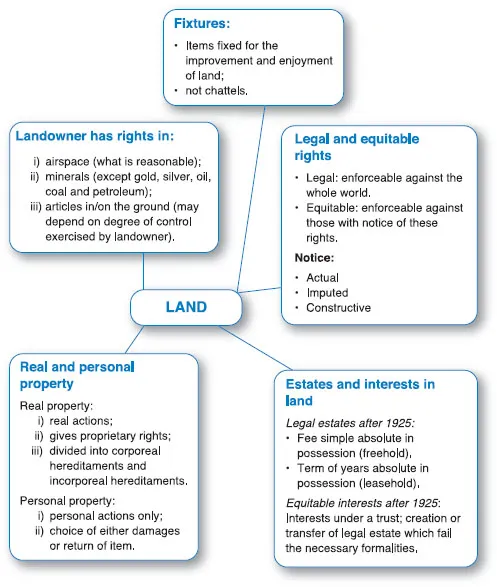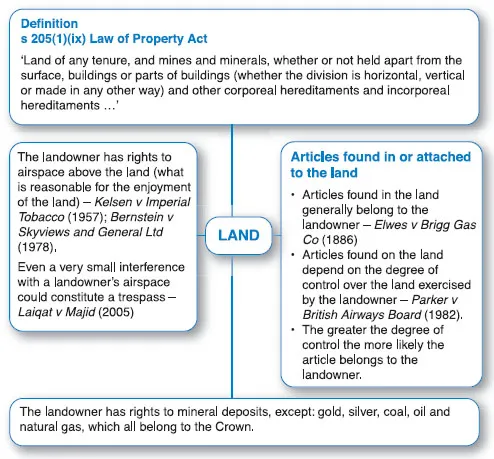
eBook - ePub
Land Law
Judith Bray
This is a test
Buch teilen
- 272 Seiten
- English
- ePUB (handyfreundlich)
- Über iOS und Android verfügbar
eBook - ePub
Land Law
Judith Bray
Angaben zum Buch
Buchvorschau
Inhaltsverzeichnis
Quellenangaben
Über dieses Buch
Key Facts Key Cases: Land Law will ensure you grasp the main concepts of your Land Law module with ease. This book explains the facts and associated case law for:
-
- The definition of land
- The registered land system
- Co-ownership
- Express, resulting and constructive trusts in land
- Leases
- Key rights in land such as easements and covenants
- Mortgages
- Proprietary estoppel and licences.
- Adverse possession
Key Facts Key Cases is the essential series for anyone studying law at LLB, postgraduate and conversion courses. The series provides the simplest and most effective way to absorb and retain all of the material essential for passing your exams. Each chapter includes:
-
- diagrams at the start of chapters to summarise key points
- structured headings and numbered points to allow for clear recall of the essential points
- charts and tables to break down more complex information
Chapters are also supported by a Key Cases section which provides the simplest and most effective way to absorb and memorise essential cases needed for exam success.
-
- Essential and leading cases are explained
- The style, layout and explanations are user friendly
- Cases are broken down into key components by use of a clear system of symbols for quick and easy visual recognition
Häufig gestellte Fragen
Wie kann ich mein Abo kündigen?
Gehe einfach zum Kontobereich in den Einstellungen und klicke auf „Abo kündigen“ – ganz einfach. Nachdem du gekündigt hast, bleibt deine Mitgliedschaft für den verbleibenden Abozeitraum, den du bereits bezahlt hast, aktiv. Mehr Informationen hier.
(Wie) Kann ich Bücher herunterladen?
Derzeit stehen all unsere auf Mobilgeräte reagierenden ePub-Bücher zum Download über die App zur Verfügung. Die meisten unserer PDFs stehen ebenfalls zum Download bereit; wir arbeiten daran, auch die übrigen PDFs zum Download anzubieten, bei denen dies aktuell noch nicht möglich ist. Weitere Informationen hier.
Welcher Unterschied besteht bei den Preisen zwischen den Aboplänen?
Mit beiden Aboplänen erhältst du vollen Zugang zur Bibliothek und allen Funktionen von Perlego. Die einzigen Unterschiede bestehen im Preis und dem Abozeitraum: Mit dem Jahresabo sparst du auf 12 Monate gerechnet im Vergleich zum Monatsabo rund 30 %.
Was ist Perlego?
Wir sind ein Online-Abodienst für Lehrbücher, bei dem du für weniger als den Preis eines einzelnen Buches pro Monat Zugang zu einer ganzen Online-Bibliothek erhältst. Mit über 1 Million Büchern zu über 1.000 verschiedenen Themen haben wir bestimmt alles, was du brauchst! Weitere Informationen hier.
Unterstützt Perlego Text-zu-Sprache?
Achte auf das Symbol zum Vorlesen in deinem nächsten Buch, um zu sehen, ob du es dir auch anhören kannst. Bei diesem Tool wird dir Text laut vorgelesen, wobei der Text beim Vorlesen auch grafisch hervorgehoben wird. Du kannst das Vorlesen jederzeit anhalten, beschleunigen und verlangsamen. Weitere Informationen hier.
Ist Land Law als Online-PDF/ePub verfügbar?
Ja, du hast Zugang zu Land Law von Judith Bray im PDF- und/oder ePub-Format sowie zu anderen beliebten Büchern aus Law & Law Theory & Practice. Aus unserem Katalog stehen dir über 1 Million Bücher zur Verfügung.
Information
1
Land


1 Land law deals with the legal relationship between land and the owner of that land.
2 Many different people can have competing claims in respect of the same piece of land.
3 The interests of owners of neighbouring land often affect the landowner’s enjoyment of his own land, so land should not be seen in isolation.
4 The competing interests of different landowners become more significant as more land is taken into residential ownership.
5 Ownership of land therefore comprises not only rights one may have over one’s own land, but also rights one may have over a neighbour’s land. Such rights may include the right to use a neighbour’s land in a particular way or to prevent a particular use a neighbour may wish to make of the land.


‘Whoever owns the soil owns everything up to the heavens and down to the depths of the earth’ (Cuius est solum, eius est usque ad coelum et ad inferos).
A landowner has no rights to enter the land of his neighbour in order to carry out repairs to his own property (John Trenberth Ltd v National Westminster Bank (1979)).
The Access to Neighbouring Land Act 1992 allows a landowner the right to make an application to court for an order allowing access for specified repairs. The terms of the order are very strictly limited to whatever access is necessary for the essential repairs to be carried out.
The ground immediately below the surface is owned by the landowner. If there is a cellar or open space below the land, it is owned by the landowner irrespective of whether he is aware of it or not (Grigsby v Melville [1974]).

1 Property is divided into real and personal property.
2 Real property mainly comprises land and is property that can be recovered by a real action, allowing a claimant to recover the property itself.
3 Personal property is property that can only be recovered by a personal action, allowing the defendant a choice between the return of the item or paying a sum in damages.
4 Historically, leaseholds were treated as personal property and could only be recovered by personal action (i.e. the claimant might have to be satisfied with damages only).
5 Today, the important issue is whether a right over land is personal or proprietary.
6 A proprietary right is a right in the land itself, which can be binding on a third-party purchaser.
7 A lease is now defined as a proprietary right in land.
8 A personal right is a right against another person and cannot bind a third party (e.g. a bare licence only gives the licensee the right to remain on the land until the licence is revoked by the licensor).
1.3.1 Real property
1 An estate in land is a right over land for a period of time.
2 Under the Law of Property Act (LPA) 1925 s 1(1) there are only two legal estates in land: leasehold and freehold.
3 An estate in land can also be called real property.
4 Land includes rights called incorporeal and corporeal hereditaments.
5 Hereditaments are rights in land that can be inherited and so can pass under a will or an intestacy.
6 Corporeal hereditaments are physical objects (e.g. land and anything attached to it, such as buildings, trees and minerals).
7 Incorporeal hereditaments are rights in land that are not physical things (e.g. easements and profits), but can be very valuable.

1 Historically:

